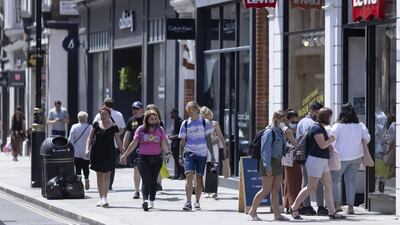British retail sales fell 1.4 per cent in May compared to April as people chose to visit reopened restaurants and cafes instead of buying food from supermarkets.
Food shop volumes dropped 5.7 per cent in May on the previous month after restrictions on eating indoors were lifted on May 17, while online sales fell for the third consecutive month after customers returned to physical shops, the Office for National Statistics said.
“Following a sharp increase last month coinciding with post-lockdown reopening, retail sales dipped slightly in May,” said Darren Morgan, director of economic statistics at the ONS.
“However, they remain well above both their pre-pandemic levels and those seen in March before shops reopened.”
Despite the May dip in overall sales, they were still 9.1 per cent above their pre-pandemic level in February 2020, with total sales in the three months to May 8.3 per cent higher than in the previous quarter.
Sales at non-food shops rose on soaring demand for outdoor furniture as people spent money on their gardens in anticipation of summer and restrictions eased on outdoor gatherings.
As a result, household goods shops recorded the highest growth in sales volumes, up 9 per cent in April on the month before, offsetting declines at clothing and department stores.
Fuel sales rose 6.2 per cent to tie in with the restrictions easing and consumers moving around more, while other popular purchases included toys and sports equipment, with sales in shops selling such items rising 7.7 per cent.
Susannah Streeter, senior investment and markets analyst at Hargreaves Lansdown, said the initial sprint to the shops in April has slowed but plenty of consumers were ready to spend on sprucing up homes and gardens.
“People have clearly been enjoying the novelty of eating at restaurants again and the easing of restrictions on dining indoors is likely to have been a factor drawing in more diners," she said.
Lisa Hooker, consumer markets leader at PwC, said more shoppers on the high street meant online sales were starting to return to a more “new normal” level, with the 28.5 per cent online penetration in May well below the 36 per cent seen earlier in the year.
“However, the headline figures mask a divergence of fortunes between different retailers. We have already seen that the recovery in footfall is skewed more heavily towards out-of-town retail parks rather than high streets and traditional shopping centres,” Ms Hooker said.
“And footfall will remain depressed until the full lifting of lockdown restrictions, currently postponed until July.”
Economists said the data did not indicate weaker consumer spending as the economy recovered from the Covid-19 crisis, because hospitality businesses reported booming trade.
However, Samuel Tombs, at consultancy Pantheon Macroeconomics, said more recent payment card data suggested the surge in consumer spending could be losing momentum.
"Households' real disposable income looks set to fall in Q4, as the end of the furlough scheme reduces employment and inflation rises to match wage growth," he said.
The rapid advance of the Delta variant of coronavirus, despite Britain's speedy vaccination drive, could also curb household spending in the weeks ahead.
The Confederation of British Industry, the nation’s biggest business lobby group, on Friday upgraded forecasts for growth this year to 8.2 per cent from 6 per cent and expects a 6.1 per cent expansion in 2022, quicker than the pace predicted by the government’s Office for Budget Responsibility.
“There are really positive signs about the economic recovery ahead this year and next,” CBI director general Tony Danker said.
“The data clearly indicates there is pent-up demand and ambition across many sectors.”
Looking ahead for retail, Ms Hooker said the picture remained positive.
“With consumer sentiment at record highs and foreign holidays still on hold, many people have disposable income to spend. The challenge for retailers is to harness this momentum through the rest of 2021," she said.


